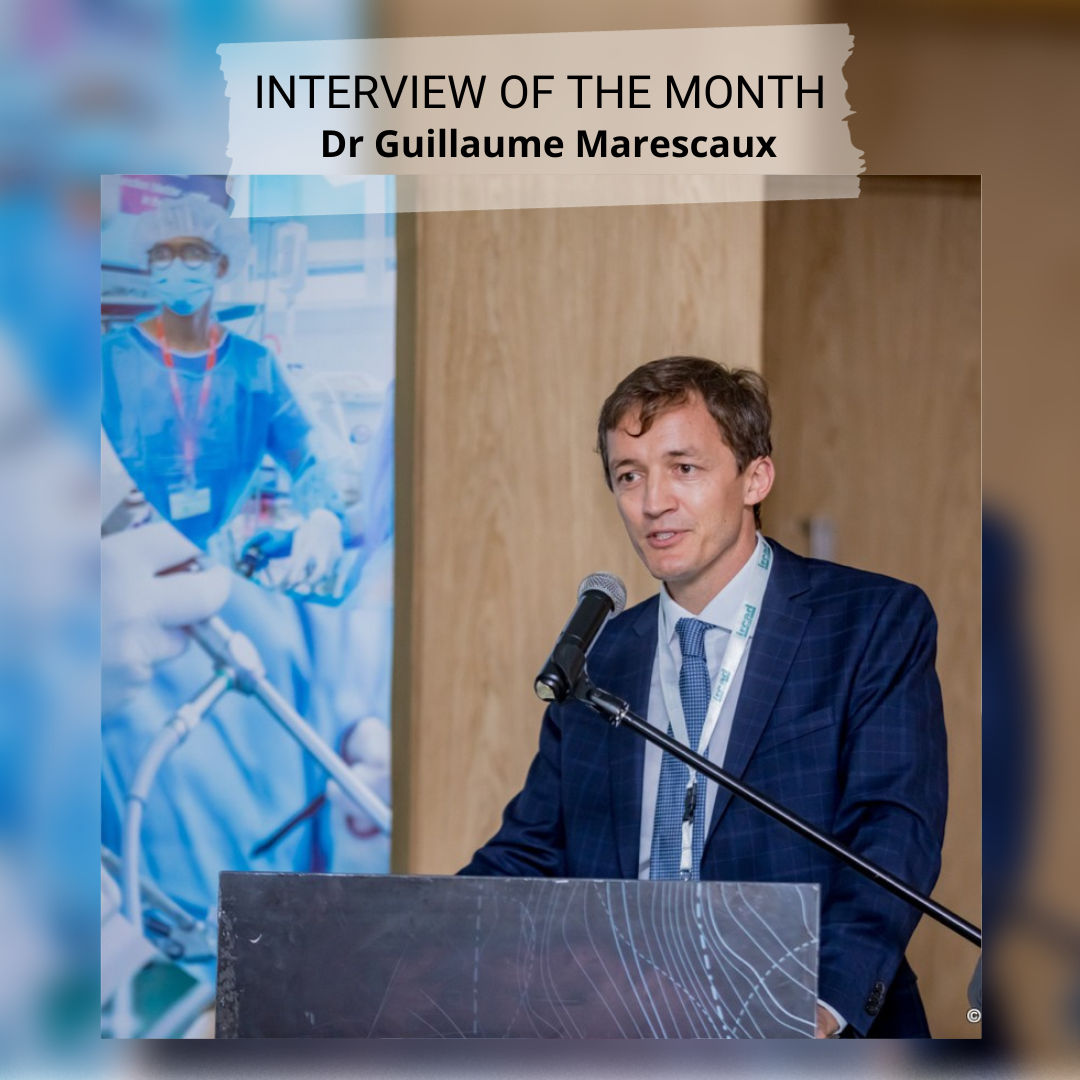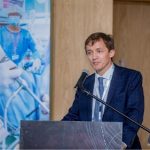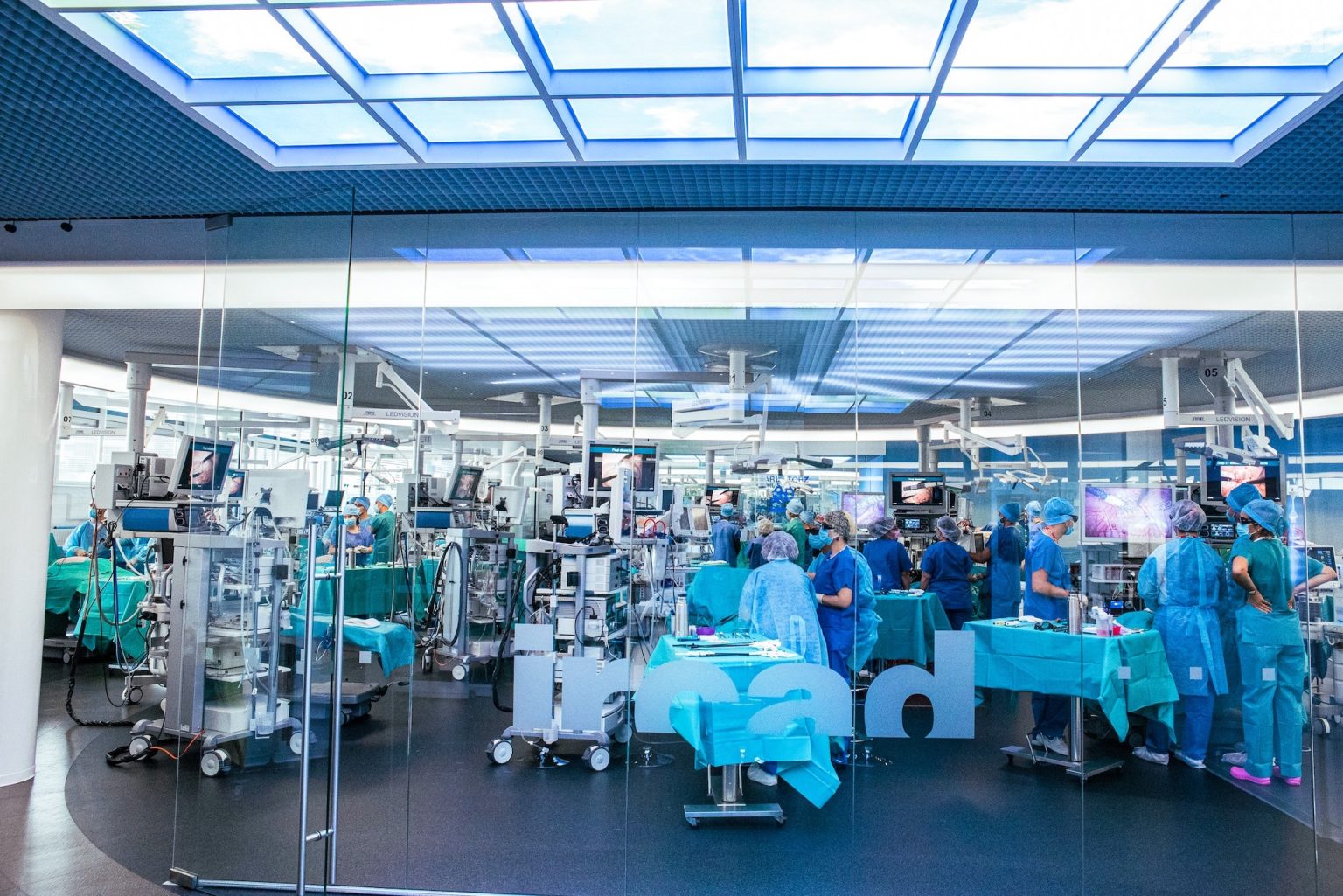
One month ago, on October 7, 2023, IRCAD Africa, the mirror institute of IRCAD Strasbourg, was inaugurated by the President of the Republic of Rwanda at the conclusion of the first week of laparoscopic surgery courses organized by the Kigali-based institute. The inaugural course, with a program identical to IRCADs on all continents, drew the participation of approximately forty experienced surgeons from 15 sub-Saharan African countries. IRCAD Africa stands as the first research and training center for minimally invasive surgery on the African continent, aiming not only to train surgeons but also to enhance access to the diagnosis and treatment of various pathologies through the Disrumpere research project.
Presently, 5 billion people worldwide lack access to medical imaging, and 2 billion lack access to the most basic surgery. Among the IRCAD France mirror institutes established over the past 15 years, IRCAD Africa is notably one of those with which the Strasbourg teams collaborate most closely. This collaboration is undoubtedly a result of the project’s inception from the dedication of individuals determined to contribute to the improvement of healthcare in Rwanda, Africa, and beyond, particularly in regions with limited medical resources.
The genesis of this initiative traces back to my son, Dr. Guillaume Marescaux, who developed a profound connection with Rwanda and its inhabitants during humanitarian missions in the country. Observing the immense healthcare needs of Rwanda and recognizing the colossal potential of a nation that has rebuilt itself with remarkable determination in less than 30 years, Guillaume embarked on a mission to persuade me to establish an IRCAD in Kigali. I must admit that I was not immediately swayed by the idea, but Guillaume’s unwavering persistence, the extraordinary resilience of the Rwandan people, and the determined support from President Paul Kagame culminated in the establishment of IRCAD Africa. This institute is now generating high expectations and hopes for advancements in healthcare throughout Africa.

Professor Jacques Marescaux
President and Founder of IRCAD
IRCAD Africa is a collaborative initiative that brings together both public and private stakeholders with the shared goal of enhancing healthcare in Rwanda and across the African continent.

Dr Guillaume Marescaux
Dental surgeon (Strasbourg)
Member of AME International
Vice-President of IRCAD Africa
Dr. Guillaume Marescaux, a dental surgeon located in Strasbourg, has actively participated in humanitarian missions in Rwanda since 2010. It was during these missions that the concept of IRCAD Africa took root. Reflecting on the journey that propelled him to unite experts and politicians, Dr. Marescaux shares his commitment to a project that aspires to transform the landscape of healthcare in Africa.
Dr. Guillaume Marescaux: I became involved in the AME International association, which aims to promote the training of healthcare personnel in Africa, alongside Dr. Charles Nsengiyumva, then an obstetrician-gynecologist at Strasbourg Hospital, now an advisor to the Rwandan Ministry of Health and Secretary General of IRCAD Africa. This commitment, which took me to Rwanda, enabled me to see that the country, in the midst of reconstruction after the 1994 genocide and with enormous health needs, was extraordinarily resilient and driven by an unshakeable determination to progress. By way of illustration, in my area of expertise, the number of dentists increased almost 3-fold between 2008 and 2017, from 0.06 to 0.19 dentists per 10,000 inhabitants between 2015 and 2017 (source WHO). And today, the government is stepping up the pace: Health Minister Sabin Nsanzimana has announced plans to quadruple the number of carers in four years. The country’s resilience, dynamism, and determination really moved me and led me to believe that the creation of an IRCAD Africa would not only be possible but useful and necessary.
It’s been a long road, constantly supported by the mobilization of everyone at IRCAD France. It was punctuated by contacts and meetings, notably with members of the Rwandan government and, of course, President Paul Kagame, who came to France to meet Professor Jacques Marescaux. The presentation of the IRCAD, its training and research programs, its state-of-the-art equipment, and its teams convinced him. The Rwandan President saw the potential of IRCAD Africa, not only for his country but for Africa as a whole. He was immediately determined to bring the project to fruition. The Rwandan government invested heavily in the project: around $25 million for the building designed by Strasbourg architect Patrick Schweitzer, who had already designed the Faculty of Architecture in Kigali.
In addition to the Rwandan government’s investment, IRCAD Africa has received support from a number of patrons: medical device patrons who have equipped the Institute and are long-standing partners of the IRCAD – Medtronic, Pentax, Karl Storz, Intuitive Surgical. We should also mention the Alsatian patrons who are loyal to the IRCAD’s projects, the Région Grand Est, which provides support for research carried out within the framework of Disrumpere, and the Agence Française de Développement, which finances the plane tickets of the French experts responsible for providing training in Kigali.
IRCAD mobilizes public and private players, both Rwandan and French: for example, the salaries of the Rwandan engineers are shared by IRCAD France and IRCAD Africa. The project unites all players around one ideal and one objective: to advance healthcare in Rwanda and, more generally, in Africa.
About IRCAD
Founded in 1994 by Professor Jacques Marescaux, IRCAD is an institute dedicated to training and research in minimally invasive surgery. This Strasbourg-based institute is globally recognized for the excellence of its training programs, which serve nearly 8,800 surgeons from around the world each year. Additionally, IRCAD offers virtual training through the Websurg online university, which is entirely free of charge and has over 470,000 members connected worldwide.
For more information, please visit https://www.ircad.com
We hope you enjoy reading the 9th issue of the IRCAD newsletter.
For further inquiries or to subscribe/unsubscribe:
FINN Partners – sante@finnpartners.com
Don’t miss the latest news from IRCAD.
Sign up here for our newsletters and communication mailings
to stay informed about us and our courses

Please note that the IRCAD administrative board and staff are closely monitoring the evolving COVID-19 situation, in full compliance with all applicable laws and regulations in France. The health, safety, and well-being of our participants, experts and staff are our top priority!
Despite the current context, the IRCAD stands firmly by your side to help you acquire knowledge and skills. Come and join us !
We would like to draw your attention that the « Vaccine Pass » is now mandatory in France since end of January 2022 and replaces the former « Health Pass » to access places that are open to the public, such as cinemas, museums, cafés and restaurants, hotels as well as the IRCAD Institute which welcomes participants in the framework of its courses and seminars. Thus, a PCR test without vaccination is no longer sufficient to take part in our courses.
The vaccine pass includes a proof of the following (one of the 3 items is sufficient):
Further information about the new vaccine pass can be found at :
We very much hope to be able to count on your kind understanding of those rules which have been set by the French Government and which our Institute is required to apply